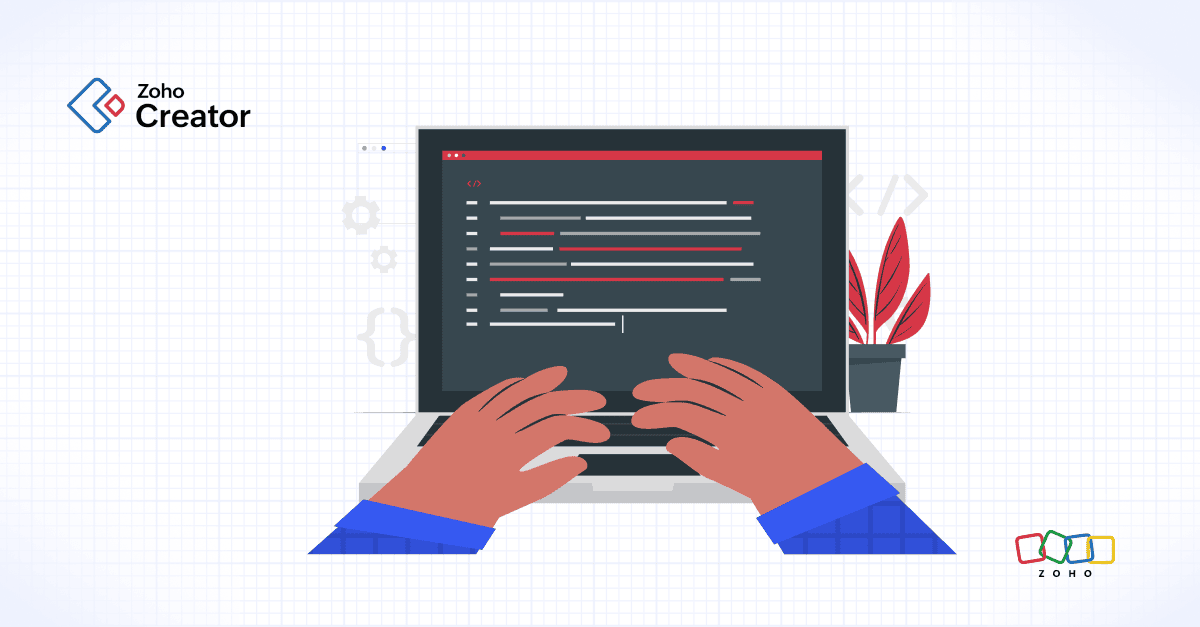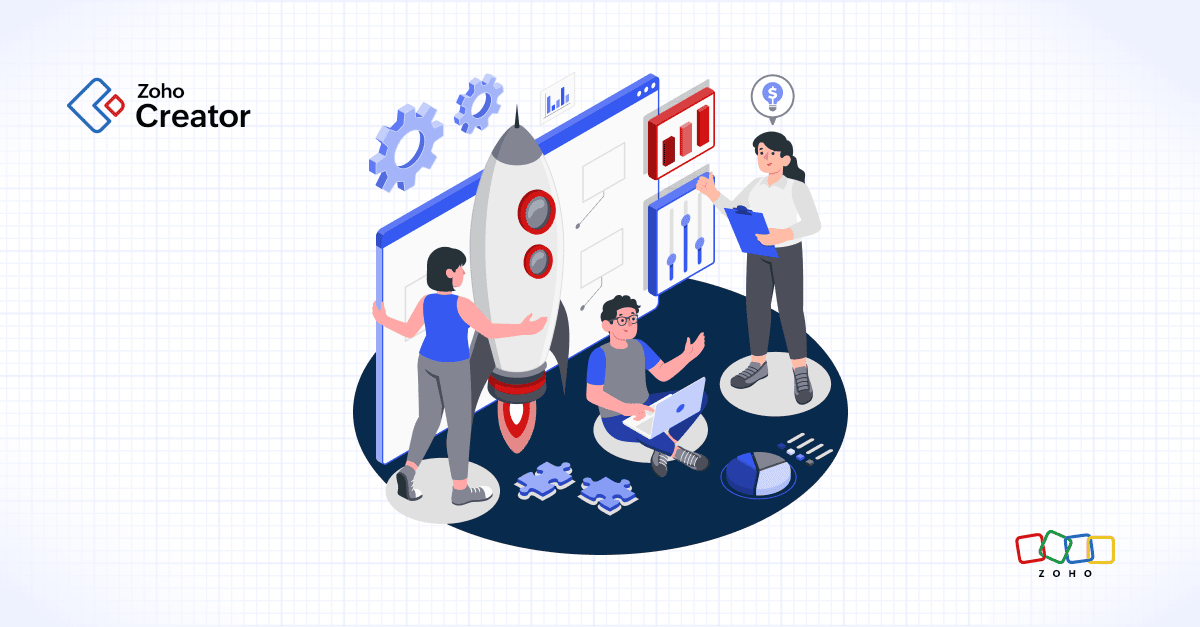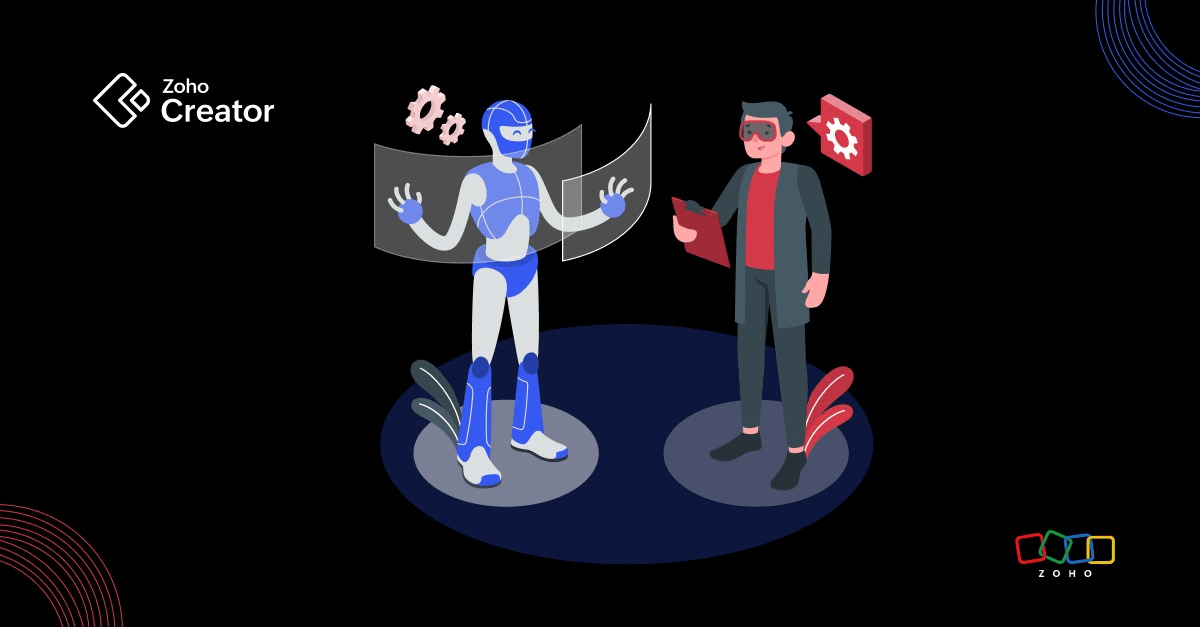- HOME
- Know Your Tech
- Why AI-assisted development is the future of enterprise app building
Why AI-assisted development is the future of enterprise app building
- Last Updated : July 10, 2025
- 456 Views
- 12 Min Read
TL;DR: AI-assisted app development is revolutionizing how enterprises build and deploy applications. By integrating AI technologies like machine learning, NLP, predictive analytics, and generative AI into low-code platforms, businesses can automate routine tasks, accelerate prototyping, and create intelligent, scalable applications with minimal coding. This shift enables faster time-to-market, personalized user experiences, and improved decision-making. Despite challenges like data quality, integration, and skill gaps, the long-term benefits—cost savings, operational efficiency, and future-ready design—make AI-enhanced app building a key strategy for modern enterprises.
According to Gartner, by 2028, 75% of new enterprise applications will be developed with AI assistance, demonstrating AI's increasing impact on development. Building enterprise applications today is about creating flexible solutions that can evolve with your business needs, but traditional development methods often come with slow processes and complexity that can hinder growth.
AI-enhanced app building addresses these challenges. AI-powered platforms simplify app development by automating repetitive tasks, offering intelligent suggestions, and speeding up workflows. This enables businesses to stay agile and quickly adapt to changing demands.
For business leaders and developers, AI-powered platforms reduce the time required to design, build, and deploy custom applications. These platforms automate manual tasks and incorporate machine learning to deliver smarter, more efficient results that align with business goals.
For those who want to avoid the complexities of traditional coding, AI-assisted low-code platforms provide an excellent solution. These tools allow you to create custom, powerful applications with minimal coding expertise, helping business users and individuals bring their ideas to life faster.
This guide will explore how AI-enhanced app building can improve efficiency, boost productivity, and drive growth.
The role of AI in modern enterprise app development
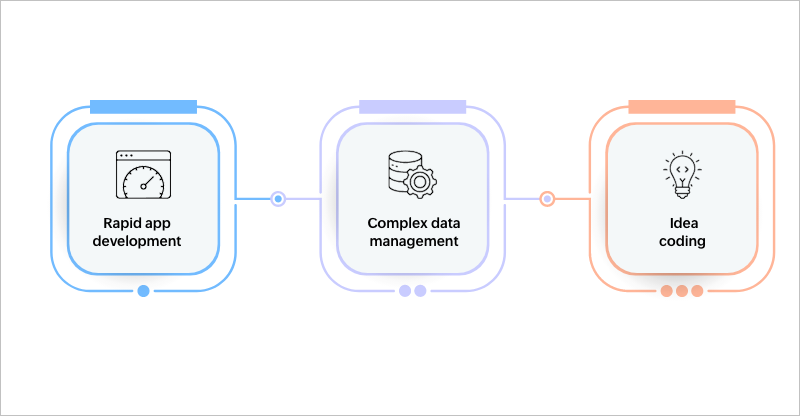
AI is redefining enterprise app development by accelerating processes, enhancing accuracy, and adapting to complex business needs. With 79% of businesses already adopting AI, it's reshaping how apps are built. Here's how AI enhances application development:
Accelerating prototyping and development
AI automates the prototyping phase, enabling rapid generation of functional models and early-stage testing. It also reduces iteration cycles by suggesting real-time improvements, cutting down on rework.
Managing complex data and logic
AI-powered tools process large datasets and reveal insights through machine learning, reducing manual efforts while improving decision-making and app intelligence.
Converting ideas into code
AI tools use NLP models to translate business logic written in plain language into executable code, reducing manual coding and speeding up development. These AI advancements significantly improve development efficiency and app functionality, making them essential for modern enterprise needs.
Next, let's explore the specific features of AI-enhanced app building and why it matters now more than ever.
Key features of AI-assisted app development
AI-assisted app development enhances efficiency, with advanced AI technologies like NLP, machine learning, and predictive analytics playing a key role. These technologies accelerate development and improve the intelligence of applications. Here's a closer look at the core AI technologies driving this transformation:
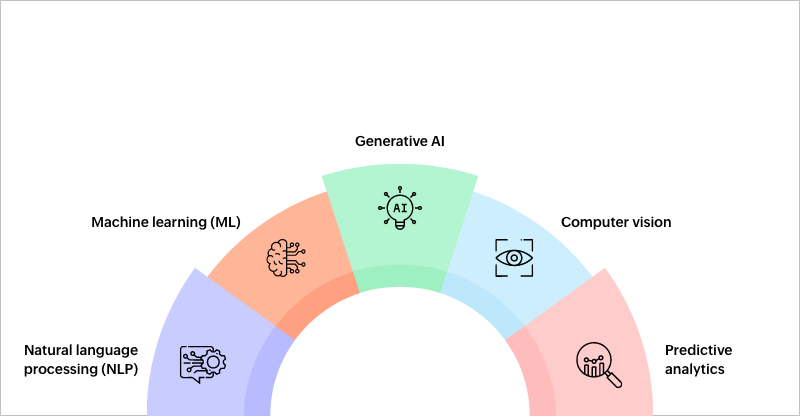
Natural language processing (NLP)
NLP enables apps to process and understand human language. For example, BERT (bidirectional encoder representations from transformers) is used to understand context-aware language, improve sentiment analysis, and recognize intent.
Real-time feedback analysis powered by NLP models like spaCy allows businesses to engage customers quickly, boosting satisfaction and retention.
Machine learning (ML)
Machine learning enhances app performance by learning from data. Supervised learning algorithms, like decision trees, predict outcomes like customer behavior, while deep learning models, like CNNs (convolutional neural networks), analyze images and videos. These models reduce manual intervention and improve predictive maintenance, anomaly detection, and personalization.
Generative AI
Generative AI tools, powered by transformer models like GPT-4o, automatically generate content like code snippets, designs, and reports based on simple inputs.
By automating repetitive tasks, these models streamline development and reduce delays, enabling teams to focus on higher-level customization and accelerating time to market.
Computer vision
AI-driven computer vision, using object detection algorithms like YOLO (you only look once) and Faster R-CNN (faster region-based convolutional neural network), interprets visual data. It's applied in real-time inventory management, quality control in manufacturing, and security applications, automating tasks that traditionally require manual inspection and reducing human error.
Predictive analytics
Predictive analytics uses historical data to forecast trends. Algorithms like ARIMA (auto regressive integrated moving average) and LSTM (long short-term memory) networks enable real-time insights into customer behavior and demand forecasting, helping businesses make proactive decisions and optimize resource allocation.
Together, these technologies build the foundation for AI-enhanced app building for businesses, creating applications that are faster to develop and smarter in operation.
Benefits of AI-assisted app development
Adopting AI-assisted development tools like Zoho Creator brings a host of advantages, allowing businesses to enhance efficiency and meet modern user demands with speed and precision. These platforms combine advanced automation with user-friendly interfaces, helping companies build sophisticated applications faster, more cost-effectively, and with greater scalability.
Here's how utilizing AI-assisted app development can benefit your business:
Increased productivity and reduced costs: AI tools integrated into low-code platforms automate routine tasks like regression testing, integration, and deployment, accelerating development cycles. By automating time-consuming manual processes, development teams can focus on more strategic aspects of app creation. This boosts productivity and reduces operational costs, as less manual input is required. With AI handling repetitive tasks, businesses can deliver solutions faster while minimizing the need for an extensive workforce and expensive infrastructure.
Personalized user experiences: AI-driven platforms enable businesses to design personalized experiences for users. Features like collaborative filtering and data-driven insights help tailor apps to user preferences, improving engagement and satisfaction. Personalization also enhances the intuitiveness of the app, ensuring it meets specific user needs and creating a dynamic, user-focused experience that evolves as preferences change.
Scalability and operational efficiency: AI dynamically adjusts resource usage with elastic scaling, ensuring smooth performance even as user bases and data loads grow. It also eliminates the need for costly infrastructure upgrades by optimizing resource allocation through real-time data analysis.
Enhanced user interaction: AI tools like chatbots, powered by GPT-4o and BERT, provide 24/7 proactive assistance, guiding users through complex processes and improving the overall user experience.
Faster time to market: By automating code generation and debugging, AI reduces development cycles, allowing businesses to deploy new features, update faster, and stay agile and responsive to customer needs.
Continuous improvement: AI's continuous learning capabilities through reinforcement learning ensure apps evolve based on user feedback and changing business requirements. This enables your applications to stay efficient and effective with minimal manual intervention.
Together, these benefits equip your business to deliver powerful, flexible, and intuitive applications essential for succeeding in a dynamic market. Let’s take a look at some key statistics that highlight its growing importance and the future potential it holds in reshaping the development landscape.
The future of AI in app development: Key stats to watch
As more organizations adopt AI, its influence on productivity and growth will only increase. Consider these key statistics that highlight AI's increasing role and its potential for shaping the future of app development:
63% of U.S. enterprise software companies now use generative AI in their development workflows, a significant rise from 14% in 2021.
McKinsey reveals that generative AI enables developers to complete coding tasks twice as fast, driving significant gains in efficiency.
More than 50% of U.S. companies with over 5,000 employees, and more than 60% of those with over 10,000 employees, are actively utilizing AI, highlighting that large enterprises are leading the way in AI adoption for app development.
83% of U.S. companies now consider AI a strategic priority, underscoring its role in maintaining a competitive edge.
These numbers reflect the rapidly expanding footprint of AI in app development, positioning it as a key driver of innovation and operational excellence.
Development lifecycle enhancements with AI
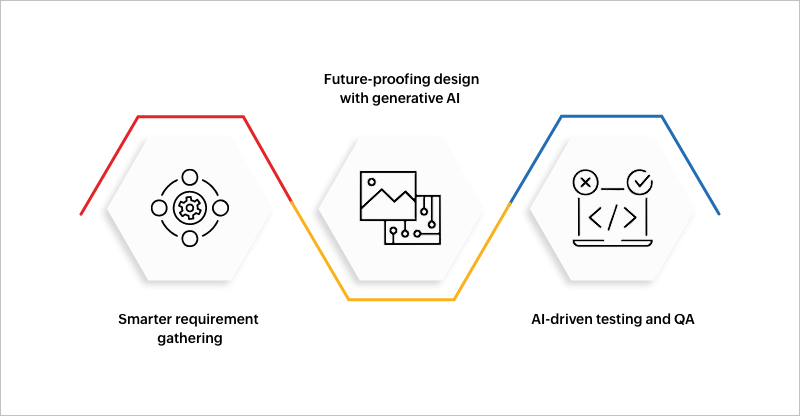
By utilizing AI tools, you can accelerate development, improve decision-making, and ensure that your applications are scalable, resilient, and aligned with your strategic business goals.
Smarter requirement gathering and business alignment
Gathering clear and detailed requirements is crucial to the success of software development. Without a proper understanding of business needs, teams risk rework, inefficiencies, and delayed delivery. AI improves this process by analyzing data from various sources, such as customer feedback, market trends, and internal reports, providing actionable insights to prioritize features and functionalities.
For example, Lamitech, a manufacturing company, turned to Zoho Creator, a scalable AI-powered low-code platform, to build custom applications that help them process customer feedback and market data.
Using the Creator platform, Lamitech was able to understand emerging needs better and prioritize the right features for their applications. This approach allowed them to focus on key requirements and minimize costly changes during development.
How AI enhances requirement gathering:
Data-driven insights: AI-powered analysis algorithms analyze customer surveys, reviews, and social media feedback to extract insights highlighting which features are critical for business success.
Prioritization with predictive models: Using custom predictive AI models, the apps can forecast business trends and highlight emerging needs. This helps prioritize features that align with immediate and long-term business goals.
Risk mitigation: By identifying potential gaps or misalignments early in the development process, AI helps reduce costly late-stage changes. Techniques like clustering and classification models ensure the project stays aligned with key business objectives.
With AI, you can focus on features that matter most, reducing the risk of rework and ensuring the final product aligns with business and customer needs.
Future-proofing design and architecture with generative AI
Building applications on scalable and adaptable architecture is a key concern in modern development. Generative AI plays a significant role by offering multiple design and architecture options, allowing your team to assess trade-offs in performance, security, and scalability quickly.
How AI supports future-proofing design:
Automated design creation: Generative AI models, like generative adversarial networks (GANs) or reinforcement learning algorithms, can automate the creation of architecture options. This significantly speeds up the decision-making process by evaluating trade-offs like resource allocation and performance optimization.
Optimizing trade-offs: AI evaluates performance, cost, and security through algorithms like multi-objective optimization and constraint satisfaction problems (CSPs), helping you select the best architecture for both short-term needs and long-term growth.
Adaptability: AI-driven design ensures your applications evolve with emerging business requirements. Model-based design and continuous integration help ensure your system can scale and adapt to new technologies without extensive rework, reducing technical debt.
This AI-driven design approach guarantees that the apps you build today are ready for future changes, protecting your investments and ensuring long-term scalability.
AI-enhanced testing and quality assurance
Testing is essential for maintaining the integrity of your application, but it can also slow down development. AI offers a solution by automating several aspects of the testing process, detecting bugs and vulnerabilities more quickly and accurately than traditional manual methods.
How AI improves testing and QA:
Automated test case generation: AI tools, using machine learning and deep learning (DL) techniques, can automatically generate test cases based on the application's codebase. Tools like DeepCode or test generation algorithms help reduce manual effort by analyzing the code and automatically suggesting test scenarios.
Faster bug detection: AI tools, such as static and dynamic analysis, use ML models to quickly identify performance issues, memory leaks, and security vulnerabilities. This early detection speeds up debugging and minimizes costly issues after deployment.
Continuous integration: Integrating AI into the CI/CD pipeline enables real-time testing with every code change. Tools like Selenium and Katalon Studio, combined with AI-powered scripts, ensure automatic and comprehensive testing, maintaining quality throughout development.
With AI-enhanced testing, you can deliver reliable applications faster, improving user experience and reducing post-launch issues.
By incorporating AI into your development lifecycle, you're setting the foundation for scalable and future-proof applications. Now let's explore how AI is being successfully applied in real-world enterprise scenarios, demonstrating its impact across various industries.
Real-world AI use cases in enterprise applications
By integrating AI with low-code platforms, businesses can simplify operations, boost productivity, and reduce IT dependency.
Healthcare: Improving patient care and operational efficiency
AI optimizes healthcare by improving diagnostics, automating tasks, and enhancing care. By processing vast data and predicting outcomes, AI minimizes errors and improves patient management.
Key AI technologies used:
Machine learning: Supervised models, like decision trees, predict patient conditions based on historical data.
Natural language processing: Tools like BERT and spaCy analyze clinical records and research for faster decision-making.
Predictive analytics: Time series models like ARIMA and LSTM forecast patient appointments and health risks, improving resource allocation and reducing wait times.
Retail: Enhancing customer experience and automating operations
AI enhances retail by delivering personalized experiences, optimizing inventory, and predicting customer behavior, leading to smarter decisions and improved customer interaction.
Key AI technologies used:
Recommender systems: Algorithms like collaborative filtering and content-based filtering personalize product suggestions.
Demand forecasting: ARIMA and XGBoost predict demand and optimize inventory, preventing overstocking.
Computer vision: YOLO and Faster R-CNN improve real-time inventory management and product placement.
Finance: Automating risk management and fraud detection
The cost of data breaches highlights the significant financial impact on the financial services sector. AI in finance enhances fraud detection, risk assessment, and customer support by analyzing transactions in real time, identifying anomalies, and boosting operational efficiency.
Key AI technologies used:
Anomaly detection: Autoencoders and k-means clustering spot unusual transaction patterns indicative of fraud.
Risk assessment: Logistic regression and decision trees evaluate credit risk from financial history and behavior.
Customer support: AI-driven virtual assistants, powered by GPT-4o and BERT, provide real-time customer support.
Enhancing customer engagement and internal workflows with AI
AI is transforming how businesses engage with customers and manage internal workflows. By automating routine tasks and improving decision-making, AI boosts efficiency and enhances customer interactions.
deSIAM, a Thailand-based food and beverage company, turned to Zoho Creator to simplify its operations. Before adopting Zoho Creator, deSIAM faced challenges like data inconsistencies and inefficiencies with manual processes. After implementing Zoho Creator, the company was able to automate tasks like inventory management, invoice generation, and quality control.
Key outcomes
50% reduction in labor costs: Automation cut down on the need for manual labor, reducing costs.
Improved data accuracy: Centralized databases eliminated errors and improved reliability.
Better customer satisfaction: Streamlined processes led to more efficient service and enhanced customer experiences.
Overcoming challenges in AI-assisted app building
AI-assisted app building brings significant benefits, but transitioning to these tools can present several challenges. Awareness of these hurdles helps you prepare and ensure a smoother adoption process.
Integration with existing systems
Many businesses rely on legacy systems, which can make integrating AI tools more complex. Ensuring the new AI platforms work seamlessly with existing software and infrastructure is crucial. This requires careful planning and, in some cases, updates to older systems.
Data quality and management
AI models need clean and well-organized data to function correctly. Businesses with fragmented or outdated data might face issues in achieving accurate results. Dedicating time to data cleaning, validation, and organization is essential before utilizing AI tools.
Skill gaps and training
AI tools often require specialized knowledge, creating a learning curve for teams. Businesses may need to invest in training or bring in new talent with expertise in AI. However, many low-code platforms are designed to simplify this process and help teams learn quickly, even without extensive technical knowledge.
Change management resistance
Introducing new technology often comes with resistance, especially when it changes established workflows. Clear communication about the benefits of AI tools, proper training, and demonstrating the value of these tools can help ease this transition.
Cost of implementation
While AI tools offer long-term value, the initial costs, including platform subscriptions, data preparation, and training, can be a concern. For smaller businesses, this may require careful consideration of the return on investment. However, the long-term benefits, such as time saved and improved efficiency, often outweigh the upfront costs.
Overcoming these challenges is essential for the successful integration of AI. By tackling each obstacle, businesses can make the most of AI-driven app development, improve operational efficiency, and lay the foundation for sustained growth and success.
Why AI-assisted app development is the future
AI is changing the way businesses operate by addressing key challenges, like inefficiency, delayed decision-making, and resource misallocation. By incorporating AI, companies can refine their processes, make faster, data-driven decisions, and foster deeper customer connections. However, for AI adoption to be truly effective, it's crucial to focus on developing the right skills within teams, investing in the necessary infrastructure, and maintaining high-quality data.
Zoho Creator provides a practical solution for businesses looking to integrate AI into their workflows. Its low-code platform streamlines app development, enabling easier task automation, scalable operations, and AI-assisted app creation—without relying heavily on IT resources.
If you're considering AI for your business, explore how Zoho Creator can help you build more efficient applications and improve your processes. You can easily sign up and start building today to see how automation and AI can enhance your business workflows.
FAQ
1. Why do many AI projects fail to transition from pilot to production?
AI projects often fail when scaling, integrating with existing systems, or meeting production standards. Proper infrastructure and thorough testing are critical for successful deployment.
2. How can enterprises address data quality issues that hinder AI effectiveness?
Enterprises must invest in data cleaning and organizing and better integration to ensure AI models use accurate and reliable data for improved performance.
3. What are the security risks associated with AI agents in enterprise applications?
AI systems can expose organizations to risks like data breaches, model manipulation, and adversarial attacks. Strong security measures and regulatory compliance are essential to mitigate these threats.
4. How can enterprises overcome the shortage of skilled AI professionals?
Enterprises can upskill current employees, collaborate with educational institutions, and use low-code AI platforms to empower non-technical teams and address the talent gap.
5. What are the ethical considerations when implementing AI in enterprise applications?
Key ethical concerns include model bias, equity, and privacy. To uphold ethical standards, businesses must ensure transparency, fairness, and accountability in their AI practices.
 Bharathi Monika Venkatesan
Bharathi Monika VenkatesanBharathi Monika Venkatesan is a content writer at Zoho Creator. Outside of work, she enjoys exploring history, reading short novels, and cherishing moments of personal introspection.

